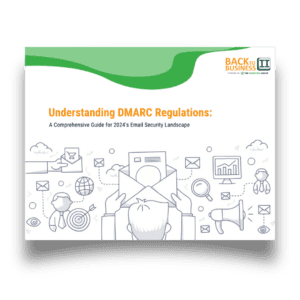
Domain-based Message Authentication, Reporting and Conformance (DMARC) is an email authentication protocol specification initially defined in early 2012. Twelve years later, DMARC remains a powerful tool to help businesses defend against threats posed by phishing attacks and emails scams. In 2024, new rules are fortifying the potency of DMARC’s protection against a continuously evolving threat landscape. Ready to learn more about how DMARC’s new rules can protect YOUR business?
That’s where our, “Understanding DMARC Regulations,” comes in. We’ve poured everything you need to know about DMARC into this guide – what it is, why it matters, and how to optimize the new regulations to keep your business safe.
Inside the guide, you’ll discover:
- DMARC demystified: We’ll break down exactly what DMARC is and how it works to block fraudulent emails from reaching your inbox. (Think of it as a digital bouncer for your email!)
- Staying on the right side of the rules: Compliance is key. We’ll share tips for staying up-to-date with the latest DMARC standards.
- Why DMARC is a Big Deal: We’ll review why these regulations, and DMARC itself, are so important for protecting your business reputation and keeping sensitive information safe.
Why You Can’t Afford to Ignore DMARC
Email might feel old-school, but it’s still a primary channel of communication for most businesses. That makes it a prime attack vector for bad actors. One wrong click by a company employee on a phishing email, and you could be dealing with a serious data breach or financial loss. That’s where DMARC steps in, helping to ensure emails that land in your employees’ inboxes are actually from verified sources.
Ready to Dive In?
The new DMARC regulations are a clear signal: email security is more important than ever. Don’t risk your business by putting it off. Download our white paper, “Understanding DMARC Regulations” today, and get equipped with the knowledge and tools you need to safeguard your communications in 2024 and beyond.
Implementing DMARC creates significant benefits for businesses, including:
- Identifying and flagging potential phishing emails to alert employees
- Preventing spoofing attacks by verifying and authenticating senders
- Reducing the volume of spam messages
- Validating your company’s credibility and brand reputation as an email sender
Download your free copy of “Understanding DMARC Regulations” today and take charge of your email security!
